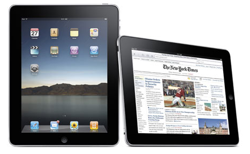
Several generations ago, a heretofore unimportant Senator arose brandishing a list which he claimed contained the names of 207 known Communists who had infiltrated the State Department. Never mind that Senator McCarthy had no such list, that the number changed from day to day. He knew that State was crawling with Communists. He felt it. The triumph of his feelings over facts destroyed lives and freedoms and are a black mark on this country’s history.
Today, the triumph of feelings over facts remains a danger in public life. Witness the FAA‘s continued ban on electronic devices during takeoff and landing. Despite no evidence(anecdotes are not evidence) that these devices are at all problematic, and evidence to the contrary, the FAA continues to enforce this ban. Disobedience of this regulation is widespread, and is a safety issue itself as fliers who don’t take this rule seriously are likely to flout other, evidence-based regulations as well.
John Quain is a veteran technology journalist, but his recent article on Fox News in support of the ban leaves us scratching our heads. Quain writes:
Some recent tests have suggested this is all unnecessary. Cell phones and other electronic devices do not, indeed could not, interfere with cockpit communications or navigation. But this is clearly false.
First Quain lumps cell phones and other electronic devices like Kindles and iPads together, then dismisses the tests as clearly false without explanation. Data says not a problem. Quain knows better.
Quain continues with some irrelevant anecdotes about how he has had devices interfere with each other, and then this gem
And what about those little e-readers like Amazon’s Kindle? They look innocent enough. Unfortunately, they can also contain embedded transceivers that constantly ping the network for updates, even if you’re not using them. And with dozens of different tablets and e-readers on the market — some with cellular services and some not — it would be nearly impossible for a flight attendant to determine the difference. Can you imagine how long it would take your flight to take off if they had to check every single gizmo?
Even if not actively engaged with a call, a cellphone’s power-on mode dispatches bursts of potentially harmful energy. For this reason, they must be placed in the proverbial “off position†prior to taxiing, as requested during the never tedious pre-takeoff safety briefing. The policy is clearly stated, but obviously unenforced, and we assume the risks are minimal or else phones would be collected or inspected visually rather than relying on the honor system. I’d venture to guess at least half of all cellular phones, whether inadvertently or out of laziness, are left on during flight. That’s about a million phones a day in the United States alone. If indeed this was a recipe for disaster, I think we’d have more evidence by now.
As for the restrictions pertaining to computers, iPods and certain other devices during takeoffs and landings, this has nothing to do with electronic interference. In theory, a poorly shielded notebook computer can emit harmful energy, but the main reason laptops need to be put away is to prevent them from becoming high-speed projectiles in the event of an impact or sudden deceleration, and from hampering an evacuation. Your computer is a piece of luggage, and luggage needs to be stowed so it doesn’t kill somebody or get in the way. The same holds for iPads and Kindles. Sure, a book can weigh as much as a Kindle, but this is where the line is drawn.
And not being able to use an electronic device then wasn’t much of a hardship. After all, I’d rather arrive late to pick up my daughter than not arrive at all.
Related articles
- Disruptions: Norelco on Takeoff? Fine. Kindle? No. (bits.blogs.nytimes.com)
- @ Airline passengers still required to turn off electronic devices at takeoff and landing…but why? (bits.blogs.nytimes.com)
- Many fliers refuse to turn off electronic gadgets (travel.usatoday.com)
- @ FAA lets pilots use iPads at takeoff and landing; passengers must still turn theirs off (bits.blogs.nytimes.com)
- Petitioners Collect Signatures For The Right To Use Electronic Devices During Takeoff And Landing (consumerist.com)
- Is Alec Baldwin Insane or Is the FAA? (abcnews.go.com)
